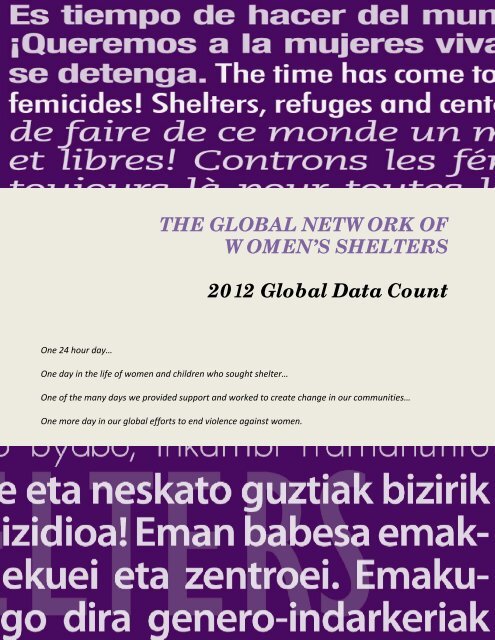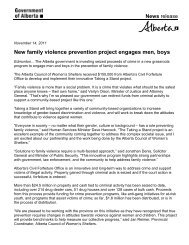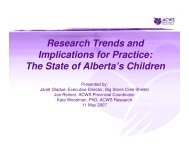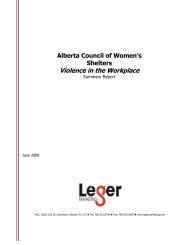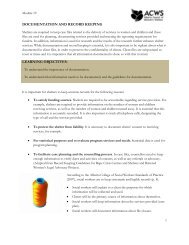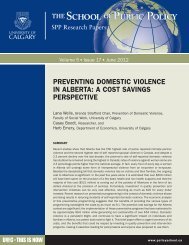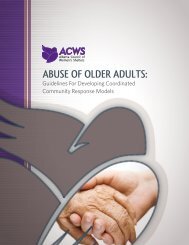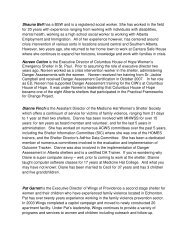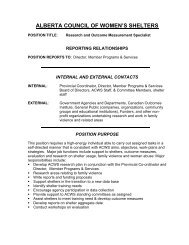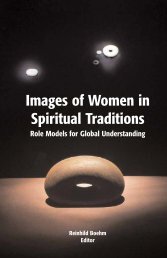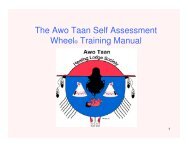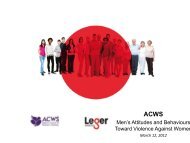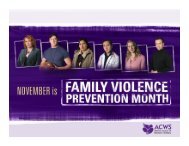Global Data Count Results - Alberta Council of Women's Shelters
Global Data Count Results - Alberta Council of Women's Shelters
Global Data Count Results - Alberta Council of Women's Shelters
- No tags were found...
You also want an ePaper? Increase the reach of your titles
YUMPU automatically turns print PDFs into web optimized ePapers that Google loves.
THE GLOBAL NETWORK OFWOMEN’S SHELTERS2012 <strong>Global</strong> <strong>Data</strong> <strong>Count</strong>One 24 hour day…One day in the life <strong>of</strong> women and children who sought shelter…One <strong>of</strong> the many days we provided support and worked to create change in our communities…One more day in our global efforts to end violence against women.<strong>Global</strong> <strong>Data</strong> <strong>Count</strong> 2012 1
ACKNOWLEDGEMENTSThe 2012 <strong>Global</strong> <strong>Count</strong> represents informationprovided by 121 participating agencies from 44countries 1 . Shelter workers and regionalIt is important for us to remember that theorganizations gathered together informationfigures in this report have their weight becausewith the help <strong>of</strong> the 106,108 women andthey represent the many resilient women andchildren who told their stories <strong>of</strong> courage and children who have come to us for safety as partresilience.<strong>of</strong> their courageous journey towards fulfillinglives free <strong>of</strong> violence and abuse.The <strong>Global</strong> Network <strong>of</strong> Women’s <strong>Shelters</strong>would like to thank everyone who participatedin the 2012 <strong>Global</strong> <strong>Count</strong>. Each year, thenumber <strong>of</strong> shelters participating in the <strong>Global</strong><strong>Count</strong> grows.TABLE OF CONTENTSThe <strong>Global</strong> <strong>Count</strong> is an ambitious exercise thatrequires the hard work and dedication <strong>of</strong> many Who We Served on This One Day ..................... 1people within the <strong>Global</strong> Network. The <strong>Global</strong> We Were Unable to Help Everyone Who<strong>Data</strong> <strong>Count</strong> Committee took the lead on this Reached Out For Our Support ........................... 6ambitious project. They are:The Barriers We Faced ...................................... 6Maria Stetter Rubin (Kommunikationschef,We Continue To Be Inspired! ............................ 8DANNER, Denmark)Breaking The Cycle – AdvocacyMargaret Augerinos (CEO, Centre for Nonand Prevention .................................................. 9Violence, Australia & WESNET Australiarepresentative)Changes We Have Seen OverJan Reimer (Executive Director, <strong>Alberta</strong> <strong>Council</strong> The Last 5 Years ............................................... 15<strong>of</strong> Women’s <strong>Shelters</strong>, Canada)The 2012 <strong>Global</strong> <strong>Data</strong> <strong>Count</strong> ........................... 18The committee would like to thank Margarita Who Is The <strong>Global</strong> Network <strong>of</strong> Women’sGuille, who translated the data count into<strong>Shelters</strong>? .......................................................... 19Spanish.How Was the <strong>Global</strong> <strong>Data</strong><strong>Count</strong> Conducted? .......................................... 19Special thanks also to:Jennifer Ness <strong>of</strong> ACWS, who assembled thedata and Lori J. Shortreed, who authored the We would also like to thank the many sheltersreport, with the assistance and expertise <strong>of</strong> who contributed pictures to use in this report.Brooks Hanewich and Dianne Henshaw.This report was produced by the <strong>Alberta</strong>Together they sorted through the wealth <strong>of</strong> <strong>Council</strong> <strong>of</strong> Women’s <strong>Shelters</strong>.responses to create the themes that resonatethroughout this report.1 Agencies include individual shelter and shelter networks.<strong>Global</strong> <strong>Data</strong> <strong>Count</strong> 2012i
THE GLOBAL COUNTThe United Nations Declaration on theElimination <strong>of</strong> Violence against Women (1993)defines the term violence against women inArticle 1 as “Any act <strong>of</strong> gender‐based violencethat results in, or is likely to result in, physical,sexual or psychological harm or suffering towomen, including threats <strong>of</strong> such acts, coercionor arbitrary deprivations <strong>of</strong> liberty, whetheroccurring in public or in private life”.The 2012 <strong>Global</strong> <strong>Count</strong> is a snapshot <strong>of</strong> one dayin the lives <strong>of</strong> women seeking refuge atwomen’s shelters around the world. It is thefourth census conducted by the <strong>Global</strong> Network<strong>of</strong> Women’s <strong>Shelters</strong>. Formed in 2008, itsinternational membership is a united body,speaking with one voice, with the commonpurpose to support and strengthen thewomen’s shelter network; and, to advocate forthe creation and implementation <strong>of</strong> socialpolicy and social values that will end violenceand oppression against women and theirchildren.Each year, the number <strong>of</strong> participatingcountries and agencies has expanded. Thegrowing number <strong>of</strong> participating countriesshows both the strength <strong>of</strong> our movement, andour dedication to bringing forward informationthat can help to focus efforts on preventing allforms <strong>of</strong> domestic violence.With each count, we have a clearerrepresentation <strong>of</strong> the scope <strong>of</strong> the issue in ourcommunities.Year Number <strong>of</strong> Participating<strong>Count</strong>ries2009 242010 302011 362012 44The <strong>Global</strong> <strong>Count</strong> is only one <strong>of</strong> our individualand collective efforts to bring about change.Women’s shelters have been at the forefront <strong>of</strong>prevention activities including public educationand national campaigns that highlight theimpact <strong>of</strong> domestic violence in ourcommunities. We have successfully lobbied ourgovernments to enact effective legislation toprotect women and children and haveadvocated with the courts and lawenforcement agencies to ensure that it isenforced.We have yet to capture the full extent <strong>of</strong>violence against women and children existing inour communities. The <strong>Global</strong> <strong>Count</strong> does notinclude information gathered from everycountry, let alone every woman’s shelter. Wemust therefore emphasize that our numbers forthe day are incomplete. Many more womenand children may have sought safe shelter, orsadly found nowhere to go. Their stories haveyet to be told.Sincerely,<strong>Global</strong> Network <strong>of</strong> Women’s <strong>Shelters</strong><strong>Global</strong> <strong>Data</strong> <strong>Count</strong> 2012ii
WHO WE SERVED ON THIS ONE DAYOf The 67,484 Women Helped1,133 Were Known To Be Pregnant<strong>Shelters</strong> provided abused women and theirchildren with safe haven and a wide range <strong>of</strong>supports. They participated in support groups,counseling, and made plans for their future. Safefrom harm, they were encouraged to recognizetheir resiliency and to take the first steps in theirphysical, psychological and emotional recovery.Most importantly, women learned they were notalone.Honduras: I arrived emotionally destroyedbecause the damages suffered have been great.We arrived without hope, with an uncertainfuture and with the dilemma <strong>of</strong> moving forwardor returning to the aggressor. But at the shelterthey empower us to see the light at the end <strong>of</strong>the road."Kosovo: My live is changed from the moment Ihad arrived in shelter, there, in this house I findthe all good peoples who helped me to be in thenew area without violence, to enrich my selfesteem and to be strong to fight against thosewho damaged my life"Vietnam: Our honor, dignity has been assuredwhen we stay at Peace House.The women received counseling to help redeemtheir self‐esteem. They participated in parentingcourses to rebuild their relationship with theirchildren and were supported in their efforts tohelp their children recover.Armenia: I was hopeless, isolated and nervous,nothing interested me and I was bothered thatmy son’s nervous behavior will never change.With individual and group studies, the relationswith my son improved, my self‐esteem raised, Ibecame more independent, organized and oldfears did not worry me anymore.Sweden: I was physically and psychologicallyabused. The support from the shelter meanseverything to me. Finally me and my childrencan see the light. We can feel joy and happinessin our lives.<strong>Global</strong> <strong>Data</strong> <strong>Count</strong> 2012 1
38,624 Children Found ReliefFrom The Physical, Psychological and Emotional AbuseExperienced As Victims <strong>of</strong> Domestic ViolenceChildren who have witnessed or been drawn intodomestic violence require sensitive andcompassionate support to help them to regaintheir sense <strong>of</strong> safety and security. In the shelters,they receive counseling that helps them to dealwith the effects <strong>of</strong> trauma, feelings <strong>of</strong> fear,anger, guilt, and depression.Taiwan: Children in the shelter don’t like to belabeled as someone who lives in a shelter. Theyfeel like they’ve been sent to the shelter becausethey did something wrong, while in fact, theyare victims <strong>of</strong> domestic violence.Italy: For the first time in our life we’ve felt safe,at home, never happened before since we’reborn (three Chinese brothers in the shelter).The women came from diverse backgrounds and communitiesIn The Participating <strong>Count</strong>ries…66% Served Aboriginal and/or Minority Ethnic Women 252% Reached Out To Women in Prostitution 330% Worked With Incarcerated Women 425% Provided Services for Transgender and Transsexual Women 564% Supported Disabled Women 62 Armenia, Australia, Austria, Cameroon, Canada, Costa Rica, Croatia, Denmark, England, Finland, Germany, Hong Kong, Israel, Italy, Kosovo, Kyrgyzstan,Morocco, Nepal, Netherlands, New Zealand, Pakistan, Peru, Puerto Rico, Saudi Arabia, Sweden, Taiwan, USA, Vietnam, Wales3 Armenia, Australia, Austria, Cameroon, Canada, Costa Rica, Croatia, Denmark, Germany, Hong Kong, Iceland, Israel, Italy, Kosovo, Kyrgyzstan, Morocco,Netherlands, Nigeria, Peru, Sweden, Taiwan, USA4 Australia, Canada, Germany, Hong Kong, Israel, Italy, Nepal, Netherlands, Niger, Nigeria, Peru, USA5 Australia, Austria, Canada, Croatia, Germany, Hong Kong, Israel, Italy, Peru, Sweden, USA6 Australia, Austria, Cameroon, Canada, Costa Rica, Croatia, Denmark, England, Ethiopia, Germany, Hong Kong, Israel, Italy, Kenya, Kosovo, Kyrgyzstan,Morocco, Nepal, Netherlands, Nigeria, Peru, Puerto Rico, Sweden, Taiwan, USA, Vietnam<strong>Global</strong> <strong>Data</strong> <strong>Count</strong> 2012 2
Aboriginal or indigenous peoples facemarginalization and exclusion within many <strong>of</strong> thepost‐colonial states, including Australia, Canada,New Zealand, and the USA. The women who aresubject to gender based violence can faceadditional barriers accessing services andsupports and in some cases discrimination intheir dealings with law enforcement.Immigrant, refugee, migrant, and womenworking as temporary foreign workers oraccompanying their husbands or other familymembers are <strong>of</strong>ten socially and physicallyisolated and lack awareness <strong>of</strong> their rights intheir new communities. Lacking social networks,financially dependent, and frightened to losetheir status or access to their children they are<strong>of</strong>ten reluctant to come forward for help.There are also a growing number <strong>of</strong> womenwithout status, those who have fallen throughthe cracks <strong>of</strong> their host countries. Some arevictims <strong>of</strong> trafficking, others disappear into theshadows and become particularly vulnerable toabuse.Austria: My visa is not valid anymore, pleasehelp me. I want to stay in Austria and I´m veryafraid about sending me back to my country. Ican´t live there anymore and my husband willfind me there and kill me…Other vulnerable populations, including olderwomen and women with disabilities, also sharedtheir stories reminding us that violence againstwomen occurs in a range <strong>of</strong> demographics.Australia: I may have disabilities but I am stillcapable and deserve to live in this world,hopefully when I move from the refuge my carerwill not be violent and I will be safe in my home.Ghana: Widows are <strong>of</strong>ten labeled as witcheswho have killed their husbands. Their childrenare given out for marriage without theknowledge <strong>of</strong> the widows for dowry. Mostwidows are <strong>of</strong>ten thrown out <strong>of</strong> their husband’shome when they refuse to choose a member inthe family to marry.61% <strong>of</strong> participating countries reportedgaps in services and supports for marginalized 7 women 87 Marginalization refers to a segment <strong>of</strong> population which is essentially "left out", or not cared about; they are <strong>of</strong>ten excluded, considered unimportant,powerless or a combination by decision makers and/or by a majority <strong>of</strong> the population.8 Armenia, Australia, Austria, Cameroon, Canada, Croatia, Cyprus, Finland, Germany, Iceland, Israel, Italy, Kenya, Kosovo, Kyrgyzstan, Morocco, Nepal,Netherlands, New Zealand, Nicaragua, Pakistan, Peru, Saint Lucia, Saudi Arabia, Sweden, Taiwan, USA<strong>Global</strong> <strong>Data</strong> <strong>Count</strong> 2012 3
<strong>Shelters</strong> and other services may struggle to meetthe needs <strong>of</strong> diverse communities. Not allshelters have staff trained in the complexities <strong>of</strong>refugee and immigrant issues. They lackresources and expertise to ensure that they arefully accessible and able to provide culturallysensitive and relevant supports.Morocco: I am scared and worried, my husbandis dangerous. I don’t speak French, how can Icommunicate with other women.The women and children who reached out tous had complex needsMany countries reported significant mentalhealth issues amongst women using shelters.Respondents felt that the mental health issuesadded another level <strong>of</strong> complexity and challengeto an already difficult situation (Taiwan, USA,Australia and Denmark). Respondents alsosuggested an increase in the number <strong>of</strong> mentalhealth disorders in women visiting their shelters(Germany, Canada).Canada: We are seeing more and more acuteco‐occurring disorders such as PTSD, mentalhealth issues and addictions.USA: People are forced to stay in abusiverelationships due to a lack <strong>of</strong> those resources.Nepal: I was mentally disturbed when broughtto shelter. I didn't know what to do. I was avictim <strong>of</strong> rape. The rapist had already flown to aforeign country. My family started behavingawkwardly after I was raped. They used totorture me day and night. Later, after I gavebirth to child, I was driven away from home.When I was in dire need <strong>of</strong> support from myfamily, I was deserted. Dejected and discarded Iwas wandering here and there not knowingwhere to go.Women faced barriers transitioning backinto communityIn many countries (Canada, Australia, USA,Austria and Sweden) shelters identified howwomen face difficulty transitioning back intocommunity due to a lack <strong>of</strong> affordable housingand shelter. The lack <strong>of</strong> housing created theimpossibility <strong>of</strong> “exit points” and an inability tomove out <strong>of</strong> the shelter. This can strain ashelter’s already taxed resources.Costa Rica: "I need an employment",…"stablework because once we're over a certain age,they won't hire us anymore", …"a safe place tolive", …"houses or apartments are above theprice”, … "I need financial help to get food andeverything my children need."Australia: Women become stuck in refuge andwe have done all we can do, now just waiting forhousing. No new women can access bedsbecause no movement is happening.How we helpedCanada: The Crisis Worker's were amazing.They were always there for me, even when Ididn't realize I would need them. Every minute <strong>of</strong>support that they <strong>of</strong>fered was priceless to mygrowth. They have an uncanny sense for when aperson needs a kind word or hug or even alonetime.Beyond the basics <strong>of</strong> safety, security, andemotional support, the women who came to theshelters mentioned repeatedly the importance <strong>of</strong>our programs and services. Many <strong>of</strong> the womencited personal development and growth in selfesteem;that they were encouraged andempowered to move forward. The education andcounseling programs were a very important part<strong>of</strong> their shelter experience.<strong>Global</strong> <strong>Data</strong> <strong>Count</strong> 2012 4
Nigeria: I feel good to be in a place where I candiscuss my problem freely" "My husband alwaystells me that there is nothing good in me, that Iam good for nothing but after this workshop, Inow know that I am good in many ways, I am agood mother, I can create things, I amwonderfully made by GodLegal help and financial literacy were also citedas vital aspects <strong>of</strong> the services received at theshelter.Nepal: I have been able to heal. Besides, I havealso filed case against the perpetrator and alsobeen able to claim property from my family.Puerto Rico: During the eight months I wassheltered, I got to know myself, value myself andthink about my children and establish priorities. Icould recognize I was a victim subjugated by myaggressor, receiving all types <strong>of</strong> bad abuse. Now,thanks to the help received at the shelter, Ilearned to value myself and believe I can make iton my own.Australia: The services connected me to legaland financial services and have helped get myissues under control”.New Zealand: Finally I am taking my powerback‐ I would not be getting this protectionorder if it was not for you.<strong>Global</strong> <strong>Data</strong> <strong>Count</strong> 2012 5
WE WERE UNABLE TO HELP EVERYONE WHOREACHED OUT FOR OUR SUPPORT8,148 Women were turned away from shelters due to lack <strong>of</strong> resources4,385 Children could not be accommodatedIn total 12,533 Women and Children were subject to continued riskOthers had nowhere to turn ‐16% <strong>of</strong> participating countries reported there were NO shelters 9THE BARRIERS WE FACED77% <strong>of</strong> shelters did not receive adequate government funding 1068% lacked financial security 1168% struggled to maintain staff due to low wages 1250% had difficulty finding trained staff 13 while25% depended upon the commitment <strong>of</strong> volunteers 1461% <strong>of</strong> shelters lacked physical security 159 Cameroon, Canada, Italy, Morocco, Niger, Nigeria, Rwanda10 Armenia, Australia, Austria, Cameroon, Canada, England, Ethiopia, Finland, Germany, Ghana, Iceland, Israel, Italy, Kenya, Kosovo, Kyrgyzstan, Mexico,Morocco, Nepal, Netherlands, New Zealand, Nicaragua, Niger, Nigeria, Pakistan, Peru, Portugal, Puerto Rico, Rwanda, St. Lucia, Sweden, Vietnam, Wales11 Armenia, Australia, Cameroon, Canada, Croatia, Cyprus, Ethiopia, Germany, Iceland, Italy, Kenya, Kosovo, Kyrgyzstan, Mexico, Morocco, Nepal,Netherlands, Nicaragua, Nigeria, Pakistan, Peru, Portugal, Puerto Rico, St. Lucia, Sweden, Syria, Taiwan, USA, Vietnam, Wales12 Australia, Cameroon, Canada, Costa Rica, Germany, Ghana, Honduras, Iceland, Israel, Italy, Kosovo, Kyrgyzstan, Mexico, Morocco, Nepal, Netherlands,New Zealand, Nicaragua, Nigeria, Pakistan, Portugal, Puerto Rico, Sweden, Syria, Taiwan, USA, Vietnam13 Australia, Cameroon, Canada, Ethiopia, Germany, Ghana, Honduras, Iceland, Italy, Kenya, Kyrgyzstan, Mexico, Morocco, Nepal, Nigeria, Pakistan, PuertoRico, Saudi Arabia, Sweden, Syria, Taiwan14 Cameroon, Canada, Germany, Iceland, Israel, Italy, Kenya, Morocco, New Zealand, Niger, Sweden15 Australia, Cameroon, Canada, Costa Rica, Cyprus, Germany, Ghana, Honduras, Iceland, Israel, Italy, Kosovo, Kyrgyzstan, Morocco, Nepal, Netherlands,Nicaragua, Niger, Nigeria, Pakistan, Peru, Rwanda, Saint Lucia, Sweden, Taiwan, Vietnam<strong>Global</strong> <strong>Data</strong> <strong>Count</strong> 2012 6
<strong>Shelters</strong> worked to maintain and deepen theirservices. While the challenges shelters facedwere varied there was one common thread: alack <strong>of</strong> secure funding leading to insecurity andthe inability to provide needed space andservices.Cameroon: The greatest challenge so far isbeen unable to provide adequate support to thewomen and children due to limited resources.Respondents from Germany, Kenya, Ghana, andMorocco pointed to a lack <strong>of</strong> training for staff asa significant problem. While this was <strong>of</strong>ten simplystated as a need for basic training, respondentsfrom Cameroon and Kenya also pointed to thefact that many <strong>of</strong> their staff were volunteers andwere “overwhelmed because they give their timeand resources to intervene in extremely difficultcircumstances.” (Kenya)Alternatively, when staff are properly trained,they are able to provide competent service andmeet the needs <strong>of</strong> the women they support.Puerto Rico: 98% or our staff have receivedknowledge about working with women anddomestic violence. 87% <strong>of</strong> our staff haveacademic preparation in domestic violence.Because <strong>of</strong> this, our staff provide excellentservice.Complex systems and bureaucracies createdadditional barriersMany countries also reported that it wasessential to work with and be able to navigate acomplex network <strong>of</strong> service providers and socialwelfare networks, such as police, legalinstitutions, educational institutions and themedical system.Australia, Cameroon, Canada, Germany, Italy,Nepal, Mexico, Netherlands, Saudi Arabia,Taiwan, and USA all stressed frustration dealingwith institutional barriers, such as police,medical, and legal systems that would notcooperate or made it difficult for women to getsupport.Mexico: It is also valuable to share the terriblefrustration that some <strong>of</strong> the benefitedpopulation and the group <strong>of</strong> pr<strong>of</strong>essionals faceagainst the personnel that is in charge <strong>of</strong> lawenforcement and that in many occasions, farfrom helping, interfere in the advance <strong>of</strong> thecases, over victimizing the women, with sexistjudgments, that corner us to desist frominitializing any legal process for their protectionand exercise <strong>of</strong> their individual rights.Some pointed to necessity to share data andinformation with other service providers; thatmany share clients or have crossoverconnections. A respondent from Germanyindicated that the barriers can be mitigatedthrough the use <strong>of</strong> networking.Germany: Bureaucracy is increasing. Manywomen are hardly able to cope with all theforms and applications. Still, the helping systemfor women and their children who haveexperienced domestic violence has expanded inthe past years. We have more legalopportunities … and more help from thecommunity due to intensive networking. Todaywe are getting more positive feedback from ourclients and we can see that our work is moresuccessful.Vietnam: Local authorities have no thoroughsolution to Domestic violence.<strong>Global</strong> <strong>Data</strong> <strong>Count</strong> 2012 7
WE CONTINUE TO BE INSPIRED!Staff at the women’s shelters face demands <strong>of</strong>extremely challenging, difficult and <strong>of</strong>tenfrustrating work, and yet they spoke <strong>of</strong> how theirexperience was rewarding, encouraging, inspiringand empowering.USA: Helping each woman identify her individualneeds and/or the needs <strong>of</strong> her children anddeveloping a plan to meet those needs isdifficult, but rewarding. Challenges <strong>of</strong> time,space, and resources are frustrating and <strong>of</strong>tenrequire a creative energy.Cameroon: It’s challenging but there is more joyin restoring hope for the hopeless.The overwhelming majority <strong>of</strong> survey respondersspoke <strong>of</strong> their experience working in the sheltersin positive terms. Staff from Australia, Kosovo,Mexico, Saint Lucia, Sweden, Pakistan and USAspoke <strong>of</strong> the reward and satisfaction they gainedassisting women to transform their lives.Sweden: It is an honour to being part <strong>of</strong>women’s processes. It is fabulous to see themtake power <strong>of</strong> their own lives and givethemselves their freedom. Fantastic to be part <strong>of</strong>the process when women leave their abusersand become free, their own, happy, braveindividuals.USA: I immensely enjoy seeing thetransformation <strong>of</strong> the women during their stayat the shelter. The women have a wonderful,unique opportunity to start their healing processand expand their networks.Staff from Cameroon, Israel, Canada, England,New Zealand, described their work as“rewarding”, they also spoke in terms <strong>of</strong> hope.Israel: Greatest satisfaction is to meet a womanwho was a shelter in the past and is now able tolive in the community, non‐violence with a joband continue to move forward in life.And respondents from Canada, USA, Germany,Italy, Nigeria, Netherlands, and Ethiopia spoke <strong>of</strong>the work in this field providing personal change.Canada: Working with women and children in ashelter setting has been more rewarding than Iever dreamed. I found that helping our clientschange their lives has also changed my own.Working in this field has been a life changingopportunity.Australia and Taiwan also spoke <strong>of</strong> learning frominspirational women that come through theirshelters.Australia: Recently I was privileged to get a visitfrom a client I supported 8 years ago. Iremember her fleeing the State under policeescort as they could not keep her safe. She hadreturned due to her mother’s ill health. Shepresented as a confident woman, in full timework. She had worked hard and bought herselfa home. The children were doing well at school.She had told her story to her manager at workand her manager agreed to donate some moneyto the shelter. This Christmas she is volunteeringher time at the service as she wants to give backto us a little <strong>of</strong> what we gave to her. This is why Ido this job.<strong>Global</strong> <strong>Data</strong> <strong>Count</strong> 2012 8
BREAKING THE CYCLE – ADVOCACY AND PREVENTION<strong>Shelters</strong> are embedded within communities.They are not simply a last resort for women andchildren in duress, rather, they have long workedto address the underlying causes <strong>of</strong> domesticviolence. <strong>Shelters</strong> have been innovators andleaders in the development <strong>of</strong> programs andservices that address gender inequality, poverty,and the requirement for systemic change thatbuild human rights and support respect for therights <strong>of</strong> all persons in our societies. 16The three clearest prevention themes identifiedby respondents were working with childrenthrough school programs, hosting and facilitatingspecific workshops on violence and abuse, andcommunity mobilization. Many <strong>of</strong> therespondents are working with local communitygroups and institutions to stop violence andabuse. Other interesting themes arose related toprevention with specific groups: the LGBQTcommunity, ethnic minorities, men, seniors,parents and <strong>of</strong>fenders.Research was an important component <strong>of</strong> theprevention and advocacy work we did. It helpedto guide our work and to build our case forchange in our values, attitudes, and institutions(Netherlands).16 Examples <strong>of</strong> preventative work (taken from From A Different World isPossible from The End Violence Against Women Coalition were providedto shelters as background information for this part <strong>of</strong> the survey.<strong>Global</strong> <strong>Data</strong> <strong>Count</strong> 2012 9
<strong>Shelters</strong> in ALL 44 reporting countries are leading effortsto advocate for change and to build safer and healthier communities77% stated they are involved in school programs 1780% stated they use media campaigns 1891% reported they use public awareness campaigns 1968% have developed gender equity campaigns 2077% are involved in community mobilization 2177% provide education to service providers 2266% work with men to change attitudes and to bring them intothe battle against domestic violence 2357% monitor and evaluate prevention activities 2417 Australia, Austria, Cameroon, Canada, Costa Rica, Croatia, Cyprus, England, Ethiopia, Finland, Germany, Hong Kong, Israel, Italy, Kenya, Kosovo,Kyrgyzstan, Mexico, Morocco, Nepal, Netherlands, Nicaragua, Nigeria, Pakistan, Peru, Portugal, Puerto Rico, Rwanda, St. Lucia, Sweden, Taiwan, USA, Wales18 Armenia, Australia, Austria, Cameroon, Canada, Costa Rica, Cyprus, Denmark, England, Finland, Germany, Hong Kong, Iceland, Israel, Italy, Kosovo,Kyrgyzstan, Morocco, Nepal, Netherlands, New Zealand, Nicaragua, Nigeria, Pakistan, Peru, Portugal, Puerto Rico, St. Lucia, Saudi Arabia, Sweden, Syria,Taiwan, USA, Vietnam, Wales19 Armenia, Australia, Austria, Cameroon, Canada, Costa Rica, Croatia, Cyprus, Denmark, Ethiopia, Finland, Germany, Ghana, Iceland, Israel, Italy, Kenya,Kosovo, Kyrgyzstan, Mexico, Morocco, Nepal, Netherlands, New Zealand, Nicaragua, Niger, Nigeria, Pakistan, Peru, Portugal, Puerto Rico, Rwanda, St. Lucia,Sweden, Syria, Taiwan, USA, Vietnam, Wales20 Armenia, Australia, Cameroon, Canada, Costa Rica, Croatia, Cyprus, Finland, Germany, Ghana, Israel, Italy, Kosovo, Kyrgyzstan, Morocco, Nepal,Netherlands, Niger, Nigeria, Pakistan, Peru, Portugal, Puerto Rico, Rwanda, Sweden, Syria, Taiwan, USA, Vietnam, Wales21 Armenia, Australia, Cameroon, Canada, Costa Rica, Cyprus, Ethiopia, Finland, Germany, Ghana, Honduras, Italy, Kenya, Kosovo, Kyrgyzstan, Morocco,Nepal, Netherlands, Nicaragua, Niger, Nigeria, Pakistan, Peru, Puerto Rico, Rwanda, St. Lucia, Sweden, Taiwan, USA, Vietnam, Wales22 Armenia, Australia, Austria, Cameroon, Canada, Costa Rica, Croatia, Cyprus, Denmark, Ethiopia, Finland, Germany, Honduras, Hong Kong, Iceland, Israel,Italy, Kosovo, Kyrgyzstan, Mexico, Morocco, Nepal, Netherlands, Nigeria, Pakistan, Portugal, Puerto Rico, St. Lucia, Sweden, Taiwan, USA, Vietnam, Wales23 Armenia, Australia, Cameroon, Canada, Cyprus, Denmark, Ethiopia, Finland, Germany, Ghana, Hong Kong, Israel, Italy, Kenya, Kosovo, Kyrgyzstan, Mexico,Morocco, Nepal, Netherlands, Niger, Nigeria, Pakistan, Peru, Rwanda, Sweden, Taiwan, USA, Wales24 Australia, Cameroon, Canada, Finland, Germany, Hong Kong, Israel, Italy, Kenya, Kosovo, Mexico, Morocco, Nepal, Netherlands, Nicaragua, Niger, Nigeria,Pakistan, Peru, Puerto Rico, Rwanda, Taiwan, USA, Vietnam, Wales<strong>Global</strong> <strong>Data</strong> <strong>Count</strong> 2012 10
Advocacy and Political Action43% <strong>of</strong> participating countriesreported there is still no national policyaddressing violence against women 2543% contended with poor legislation 26while57% believed there is good legislationbut it is poorly implemented 27<strong>Shelters</strong> have long been at the forefront inadvocating for stronger legislation and socialpolicy to protect women and children and toimprove access to supports for victims <strong>of</strong>violence. They have fought for nationallegislation to protect the rights <strong>of</strong> women andchildren, for laws against femicide, trafficking,discrimination and sexual harassment.They have taken the lead in forging partnershipswith law enforcement, legal communities andsocial justice agencies to work towards change inpolitical institutions, legislation and policies andto support the equality <strong>of</strong> women (Netherlands,Finland, Kyrgyzstan, Morocco).Netherlands: We are founders <strong>of</strong> a "PoliticalParty" in favour <strong>of</strong> Domestic Happiness. Duringlocal and national elections we are on the streetto spread our message and to comment theprograms <strong>of</strong> the regular political parties on thesubject <strong>of</strong> prevention <strong>of</strong> domestic violence.25 Australia, Cameroon, Canada, Ethiopia, Germany, Israel, Italy, Kenya,Kyrgyzstan, Morocco, Nepal, Netherlands, Nicaragua, Nigeria, Pakistan,Peru, Syria, Wales26 Armenia, Australia, Cameroon, Canada, Finland, Germany, Ghana,Italy, Mexico, Morocco, Nepal, Netherlands, Niger, Nigeria, Pakistan,Saudi Arabia, Sweden, Syria, Taiwan27 Australia, Canada, Costa Rica, Croatia, Cyprus, Ethiopia, Germany,Honduras, Iceland, Italy, Kosovo, Kyrgyzstan, Nepal, Nicaragua, Nigeria,Pakistan, Peru, Portugal, Puerto Rico, St. Lucia, Sweden, Taiwan,Vietnam, WalesFinland: Lobbying for the needed services,structures and resources among local andnational decision makers.Kyrgyzstan: CC “Sezim” was one <strong>of</strong> the initiators<strong>of</strong> the Law “On social‐legal protection fromfamily violence”, adopted in the year <strong>of</strong> 2003.Morocco: Awareness raising campaigns inmarginalized regions; local and internationaladvocacy supporting a new law protectingwomen against violence; creation <strong>of</strong> an equalityand equity institution.Australia: Campaigned for "Equal Pay' withAustralian Services Union.Working together with men to end domesticviolence<strong>Shelters</strong> are working with men for genderequality and in the promotion <strong>of</strong> safety andjustice for women and children. As fathers, sons,and husbands, they are equally impacted byviolence against the women and children theylove and support. Prevention activities havefocused on bringing men into the efforts tochange cultural values that promote andperpetuate violence against women (Cameroon,Pakistan, Armenia, Netherlands).Cameroon: Our organization is involved inorganizing workshops and seminars thatinvolved both men and women in order to raiseawareness on the fact that violence againstwomen is a violation <strong>of</strong> a woman's fundamentalrights.Pakistan: Engaging men to end violence againstwomen through school, colleges, andcommunity groups.<strong>Global</strong> <strong>Data</strong> <strong>Count</strong> 2012 11
Armenia: "Men against Violence againstWomen", is training for men with the purpose toinvolve men in combating domestic violence inArmenia as well as to create men‐networks.Working with media to engage communityThe shelters and their community partners areinvolved in numerous national campaigns to raiseawareness about domestic violence. Media havelong been important partners in getting themessage out and in championing the issue.Finland: We have a 3 year co‐operation withone <strong>of</strong> the biggest womens' magazines inFinland: they regularly write articles aboutdomestic violence, how to recognize it and howto get help.Partnering with educational Institutions toraise awareness and change attitudesA number <strong>of</strong> the respondents highlighted theirefforts to reach children in school and to teachabout the impacts <strong>of</strong> domestic violence andabuse. They <strong>of</strong>fered a wide range <strong>of</strong> programswith the intent to raise awareness that childrenare <strong>of</strong>ten victims when women are abused(Canada, Kenya, Netherlands, Pakistan, Sweden,USA, Australia, Denmark, Germany, Finland).<strong>Shelters</strong> also work with universities to raiseawareness with young adults about violenceagainst women and children (Sweden, Germany).Kenya: We have launched a program onawareness focusing specifically on schools <strong>of</strong>girls and boys with a hearing disability.Denmark: In order to prevent dating violenceLOKK has produced an app where young peoplecan get information about violence and testthemselves.Germany: We go to schools to talk aboutviolence and what we can do against it. Westarted a campaign with design art studentsthat will make a campaign to our topic andpresent it in different locations.Finland: We made with school students a leafletfor teachers and youth workers "Dare to talkabout violence ‐ three ways <strong>of</strong> discussingdomestic violence in junior high school".Mexico: We have developed preventive actionsby giving thematic workshops in basic educationschools (elementary, middle and junior highschools), also to teachers, mothers and fathers.USA: School programs include: Respect, SafeDates, Hands are Not for Hurting, IncredibleYears, and other age appropriate curriculum.Canada: Individual counseling for children whohave witnessed woman abuse Stop Abuse inRelationships (STAR) Program ‐ individualcounseling for secondary school students relatedto dating violence, bullying and healthyrelationships; classroom and communitypresentations on healthy and unhealthyrelationships.<strong>Global</strong> <strong>Data</strong> <strong>Count</strong> 2012 12
Building community capacity throughworkshops and trainingThere was a clear focus on raising awareness andtraining for men and women and institutionalauthorities (e.g., police) on violence againstwomen and how to recognize and prevent it(Cameroon, Canada, Mexico, Canada, Kosovo,Austria, Armenia, Nigeria, Vietnam).Kosovo: Organize workshops and roundtableswith all key actors including governmentalmechanisms and line ministries, Kosovo Police,civil society.Austria: We <strong>of</strong>fer trainings for police <strong>of</strong>ficers,nurses, staff from the youth welfare service.Nigeria: We have led customized empowermentworkshops for 220 women in the community.These workshops are designed to help womenincrease their self‐confidence and selfknowledgeso that they can discover what’simportant to them. After identifying theirdreams, we teach them to translate thisknowledge into a workable vision that they canmanifest through an actionable growth strategyto attain their goals. We also provide them withassistance in identifying and transforming thelimiting beliefs that inevitably arise whencreating something new.Collaboration and community mobilizationMany respondents indicated that they areworking with various community institutions, likethe church, police, religious institutions andservice groups. Community mobilization focusedon strengthening networks and alliances withlocal community groups and institutions, buildingcapacity to support women and to open dialoguewithin communities (Niger, Sweden, Germany,Peru, Canada, Pakistan, USA, Denmark, Finland,Vietnam).Niger: Working with police <strong>of</strong>ficers, religiousgroups (Muslims and Christians), medical(nurses, doctors, etc.), civil servants.Sweden: Collaborate with the local police andsocial services; forming a local team called "the<strong>Women's</strong> Safety Team".Germany: We talk about different aspects <strong>of</strong> ourwork to interested groups like church, Lions,Rotary.Canada: Doing educational seminars to localcommunity groups and religious organizations.USA: Our agency has a Prevention Program thatis within the local schools in the area and doesspeaking engagements to local church's, socialclubs, etc., to explain what domestic violence is,warning signs, and what resources are available.Denmark: LOKK has from November 2012started an intervention center in one region <strong>of</strong>Denmark. When the police in this region hascases <strong>of</strong> domestic violence they will contact thelocal shelter, who will provide counseling for thevictim and also for the perpetrator incooperation with the organization “Dialogagainst Violence”.Finland: We organise regularly meetings andeducation to our shelter workers and alsoeducate the workers <strong>of</strong> local municipalities todeal with domestic violence problems.Creating safer workplaces<strong>Shelters</strong> have also created specific programs forthe workplace to address sexual harassment andto make workplaces safer places for women.<strong>Global</strong> <strong>Data</strong> <strong>Count</strong> 2012 13
Canada: We have programmes which focus ondomestic violence in the workplace; engagingemployers, employees and management…Meeting the needs <strong>of</strong> minorities – we arehere to serve all survivors<strong>Shelters</strong> can be havens for anyone seeking toescape the trauma <strong>of</strong> domestic violence. In ourincreasingly diverse societies, sexual minorities(lesbian, gay, bi‐sexual, queer, and transgender/trans‐sexual),members <strong>of</strong> ethniccommunities, indigenous peoples, seniors, andmen all required our support. We providedshelter and, we helped to create awarenessabout the prevalence <strong>of</strong> violence against some <strong>of</strong>the most marginalized in our communities.Sexual MinoritiesUSA: Provide workshops and presentations ondomestic violence both in heterosexual and LGBTcommunities for various organizations includinggovernment agencies, colleges, other NGOs andcommunity groups such as churches. … Workwith Rainbow Response Coalition particularlyaround safe housing for LGBTQ survivors,participation in DV Awareness Month planningcommittee.Ethnic MinoritiesUSA: Provide support for community groups toaddress domestic violence in their communities,we have been working closely with Arab Culturaland Community Center's DV program, we haveJapanese women's group who provide DVeducations in Japanese language, also Thaiwomen's group who produces literature on DVprevention. We welcome various communitygroups to contact us and receive technicalassistance on DV prevention and education forfree.SeniorsCanada: Women came to our shelter today tobe a part <strong>of</strong> a support group for senior womenwho have experienced domestic violence andintergenerational family violence.Canada: Our organization goes out into thecommunity and provides educationalpresentations on elder abuse… (what it is, howto recognize it, what to do about it)Breaking the cycle ‐ working with <strong>of</strong>fendersUltimately, we are seeking a solution to theproblem <strong>of</strong> violence against women, children, andother vulnerable individuals. This must includeworking with the perpetrators <strong>of</strong> violence, to bringabout change, and to engage them personally toaddress the problem and to understand theconsequences <strong>of</strong> their actions.Canada: High risk <strong>of</strong>fender management projectwhere police, crown, VAW, CAS and malebatterers program staff collaborate to mitigaterisk and increase safety while holding abusersaccountable. … “Caring Dads” was developed byan agency, our shelter ED, child protection staff,and others, to mitigate risk and break theintergenerational violence cycle.Netherlands: Our organization also <strong>of</strong>fersshelter to perpetrators whom are evicted fromhome. This is within the scope <strong>of</strong> “the LawTemporary Restraining Order”.<strong>Global</strong> <strong>Data</strong> <strong>Count</strong> 2012 14
CHANGES WE HAVE SEEN IN THE LAST 5 YEARSWhen asked about major changes in theircountry in the last 5 years, the most commonresponse world‐wide was increased awareness <strong>of</strong>the issues around domestic violence. Surveyrespondersfrom 18 countries cited greatersensitivity to the issue. Increased mediaattention to issues surrounding domesticviolence was mentioned specifically by 12countries (Croatia, Finland, Nepal, USA,Germany, Italy, Kenya, Netherlands, Nicaragua,Pakistan, Sweden, Taiwan).Australia: The Victorian Family Violence Act <strong>of</strong>2008 is the best in the country so it provideshope for change and opportunities for those inneed to have their voices heard.Israel: What stands out especially are laws thatgive economic rights and better material forwomen in shelters to help them prepare forindependent living.Taiwan: In the last 5 years, the awareness forthe need <strong>of</strong> protection <strong>of</strong> women who sufferfrom domestic violence is getting higher andhigher in the public sphere, and the resource andadvocacy for rescuing women are also becomemore varied. The awareness <strong>of</strong> those who askfor assistance and those who help the victims isalso making progress.There was also a trend toward increasedreporting <strong>of</strong> incidents <strong>of</strong> domestic violence incountries such as Armenia, Australia, Kenya,Netherlands, Nigeria, Saint Lucia, Sweden, UK.Along with increased awareness about the issues<strong>of</strong> domestic violence, many countries report thattheir governments are putting improvedlegislation in place regarding stalking (Italy,Denmark), and domestic violence in general(Australia, Austria, Morocco, Kyrgyzstan, Kosovo,Hong Kong, Nepal, Netherland, New Zealand,Nigeria, Portugal, Taiwan, USA, Vietnam, Wales).As each country faces different issues, there is abroad range in the nature <strong>of</strong> the laws passed.Finland: All battery at home is now undergeneral prosecution ‐ which means that thejudicial process goes forward regardless <strong>of</strong> theactions <strong>of</strong> the victim,Honduras: Approval <strong>of</strong> second plan on genderequity and a law against human trafficking.Increasing fathers’ rights was cited by 4 countries(Australia, Austria, Germany, Netherlands) as amajor change in the last five years.The progress towards change is well‐illustratedby the situation in Wales, where acomprehensive public relations campaign begunin 2009 brought about major attitudinal changewhich has since resulted in proposed legislationthat will be passed in 2013 and implemented in2014.Wales: Proposals in the Bill include the majority<strong>of</strong> what WWA (Welsh Women’s Aid) and thewider VAW sector have been asking for includingcompulsory preventative education on healthyrelationships in the Welsh Curriculum in allschools, an Independent Ministerial Advisor onVAW, compulsory workplace VAW policies andstatutory duties on public bodies to take greateraction to tackle VAW locally and regionally.Both the United States and England have newlegislation that broadens the definition <strong>of</strong>domestic violence to include psychologicalintimidation and controlling behaviour, and theselaws will apply to youth under 18 years <strong>of</strong> age.<strong>Global</strong> <strong>Data</strong> <strong>Count</strong> 2012 15
In some countries, however, legislation has beenproposed but women are still awaiting itspassage (Cameroon, Ghana). Women inCameroon are hopeful that long‐awaitedlegislation will soon be passed.Cameroon: Well since 1979, the law regulatingthe situation <strong>of</strong> women in Cameroon has been inthe parliament but last year members <strong>of</strong>parliament started deliberation on this law andwe are hoping that by the end <strong>of</strong> this yearparliament must have changed some <strong>of</strong> the lawsaffecting women in Cameroon. Some countriesreport improved legislation, but admit there is along way to go.Morocco: The main changes are related to theconstitution which recognizes the supremacy <strong>of</strong>international laws, bans discrimination andviolence and calls for parity and gender equality.Other national laws were amended, yet theremany others in the penal code and family codein addition to labour code which need to bereformed to ensure legal protection to women.We are currently calling for the amendment <strong>of</strong>an article in the penal code which allows therapist to marry the victim in order not to bejailed.Increased awareness has not yet lead tolegislative changes in some places. (Pakistan,Syria)Pakistan: It has started becoming a much visibleissue <strong>of</strong> the country but yet there is nolegislation against it.Many countries have seen funding for sheltersand women’s support services reduced (Canada,Germany, Syria, USA) in the past five years.USA: Over the past 12 years participants andworkers in the social service field have seen adrastic reduction in service providers and theresources that are government funded.Government funded resources that assisted ineliminating barriers such as transportation,childcare, food and housing have become scarce.Even 6 years ago there were agencies thatwould assist with paying car insurance, carrepairs, childcare fees, college tuition / booksand down payment assistance. Most <strong>of</strong> thoseresources lost funding and ceased to exist.On the other hand, there are some countries inwhich training and funding for staff has increased(Germany, Sweden) and many also report newprogramming for women’s support services(Australia, Cameroon, Denmark, England, NewZealand, Taiwan, Vietnam). In Denmark, there isnow free anonymous counseling outside theshelters, in the 2 major cities.Taiwan: … Coordinated efforts among agencies;Multi‐agency risk assessment <strong>of</strong> high‐risk case inDV: brought the idea from Multi‐Agency RiskAssessment Conference (MARAC) from Britainwhich assembled social welfare department,police department, health department, andmedical department etc. through once a monthintensive meetings to discuss issues, divide work,and reduce the risk and frequency <strong>of</strong> violenceagainst the victims.Expanded training for the police, and newcooperative efforts with the judicial system alsoemerged as a trend in many other countries thatresponded to the survey (Australia, Israel,Kosovo, Germany, Netherlands, New Zealand andNigeria). Even in countries where traditionalresources have been scarce, there is renewedawareness and new strategies are taking hold.Saudi Arabia: There is a renaissance in helpingwomen overcome violence and we are still at thebeginning <strong>of</strong> the road.<strong>Global</strong> <strong>Data</strong> <strong>Count</strong> 2012 16
Several survey responders noted a change inawareness and in the reporting <strong>of</strong> abuse againstwomen in vulnerable populations, including elderabuse (USA, Canada), and women in immigrantcommunities (Austria, Canada, Sweden, USA)USA: the increase <strong>of</strong> anti‐immigrant sentimenthas grown in our country and it can be seen inthe lack <strong>of</strong> commitment from politicians to passlegislation that protects and provide services toimmigrant women or other minority group.Women leaving prostitution (Iceland), LGBTwomen (USA) or women with mental healthproblems are also vulnerable to domesticviolence.Canada: There are more and more governmentdoors closing for help for the mentally ill andwomen with addictions or multiple needs so weare seeing more <strong>of</strong> these women in abusivesituations with little skills or resources to help.Changes in laws and in practice in the prevention<strong>of</strong> domestic violence were noted in several <strong>of</strong> theresponses (Australia, Austria, Cameroon, Cyprus,Denmark, Puerto Rico, Vietnam) though thestrategies around prevention varied from countryto country. For some, prevention meantincreasing awareness campaigns, while forothers; more cooperation from the police wascited as a preventive measure.Australia: South Australia and a number <strong>of</strong>other states in Australia have recent updates inlegislation governing Intervention Orders (orrestraining orders/apprehended violence ordersetc.In Costa Rica, prevention measures mentionedincluded more participation <strong>of</strong> female citizens inlocal governments, more access to microbusinessprojects for women, and more awarenessand conscience among the population <strong>of</strong>the unequal distribution <strong>of</strong> workloads as careand home activities.Survey responses on the whole reported mostlypositive changes over the last 5 years, butsometimes discouragement with the pace <strong>of</strong>change and the scope <strong>of</strong> the problems crept in.For example, this response from Canada.Canada: No major changes ‐ we are still so veryfar behind the times when it comes toaddressing Domestic Violence and the needs <strong>of</strong>the women and children we serve.Puerto Rico: Our country have been workinghard to find equality for women’s and theirsafety by different programs like for exampleGPS for aggressors, and the policy for the policedepartment in different municipality that giveprevent and safety for domestic violencewomen’s.<strong>Global</strong> <strong>Data</strong> <strong>Count</strong> 2012 17
Participating <strong>Shelters</strong> in(<strong>Count</strong>ry):THE 2012 GLOBAL COUNTNumber <strong>of</strong>women helpedtodayHow manywerepregnant?Number <strong>of</strong>children helpedtodayNumber <strong>of</strong>women turnedaway todayNumber <strong>of</strong>children turnedaway today1 Armenia 18 0 8 1 22 Australia 783 30 729 66 ‐3 Austria 186 4 177 4 34 Cameroon 40 2 11 19 95 Canada 3817 76 2193 283 1466 Costa Rica 38 1 21 0 07 Croatia 47 1 18 0 08 Cyprus 35 0 8 2 39 Denmark 333 ‐ 229 10 910 England 15440 725 6030 1020 ‐11 Ethiopia 89 20 37 37 ‐12 Finland 62 2 74 0 013 Germany 1110 33 653 43 4114 Ghana*15 Guatemala 110 1 9 0 016 Honduras 36 1 12 0 017 Hong Kong 74 0 27 0 018 Iceland 20 1 2 0 019 Israel* 128 17 193 12 1920 Italy 650 21 150 22 2421 Kenya 16 ‐ 6 10 022 Kosovo (Republic <strong>of</strong>) 160 ‐ 60 10 1023 Kyrgyzstan ** 12 ‐ 0 ‐ ‐24 Mexico 32 2 217 0 025 Morocco 23 3 9 2 326 Nepal 115 6 14 0 027 Netherlands 1109 36 862 42 1528 New Zealand 277 42 237 1 029 Nicaragua 45 2 5 0 030 Niger 10 ‐ 5 ‐ ‐31 Nigeria 350 9 77 300 8032 Pakistan 1450 25 55 0 033 Peru 360 45 65 0 034 Portugal 32 1 10 0 035 Puerto Rico 175 0 147 1 136 Rwanda 36 1 5 0 037 Saint Lucia 152 2 24 0 038 Saudi Arabia 40 1 8 30 339 Sweden 89 5 44 9 1340 Syria 25 0 7 2 041 Taiwan 325 16 173 0 042 USA 37974 ‐ 24783 6200 400443 Vietnam 12 ‐ 0 0 044 Wales 1649 2 1230 22 ‐TOTAL 67484 1133 38624 8148 4385A (‐) sign wherever indicated on the above chart means information was either not collected or unknown.*Ghana and 1 out <strong>of</strong> 2 reporting agencies for Israel did not provide daily data so they are not reflected in this chart.** Did not provide daily data, average daily figure based on 2011 annual report<strong>Global</strong> <strong>Data</strong> <strong>Count</strong> 2012 18
WHO IS THE GLOBAL NETWORK OF SHELTERS?The <strong>Global</strong> Network <strong>of</strong> Women’s <strong>Shelters</strong> is made up <strong>of</strong> 20 shelter organizations from 17 countries.The founding member organizations come from the following regions:ArmeniaAustraliaCanadaDenmarkEnglandEuropeIcelandIsraelItalyMexicoNepalNetherlandsPakistanIts international membership is bound together by the following goals:RwandaSwedenThe AmericasUnited StatesVietnam1. To be a strong and active global network with a recognized international voice2. To ensure global awareness <strong>of</strong> violence against women and their children3. To support and strengthen the women’s shelter movement4. To promote effective policies and their implementation in order to prevent violence and protectand empower women and their children5. To promote social change that ends violence and oppression against women and their childrenHOW WAS THE GLOBAL COUNT CONDUCTED?How it StartedIn September 2008, shelters from around the world came together for the first ever world conference <strong>of</strong>shelter workers in Edmonton, <strong>Alberta</strong>, Canada. This landmark event was organized by the <strong>Alberta</strong><strong>Council</strong> <strong>of</strong> Women’s <strong>Shelters</strong>. A number <strong>of</strong> action items were identified at the conference – one <strong>of</strong>which being the need to conduct a global data count. The first <strong>Global</strong> <strong>Data</strong> <strong>Count</strong> was conducted on oneday during the fourth quarter <strong>of</strong> 2009. These outcomes represented the <strong>Global</strong> Network <strong>of</strong> Women’s<strong>Shelters</strong> first attempt at generating a tool to better link shelters and generate appreciation <strong>of</strong> their vitalplace in the world. In February 2010, the results were presented to the Commission on the Status <strong>of</strong>Women in New York. In 2012, the National Network to End Domestic Violence (NNEDV) organized theSecond World Conference <strong>of</strong> Women’s <strong>Shelters</strong> in Washington, DC and our contact list for the datacount grew even larger.<strong>Data</strong> <strong>Count</strong> 2012Members <strong>of</strong> the <strong>Global</strong> <strong>Data</strong> <strong>Count</strong> Committee garnered feedback from participants in the 2011 datacount and solicited questions for the 2012 data count. An information package was developed anddisseminated to the <strong>Global</strong> Network members, past participants <strong>of</strong> the 1st World Conference <strong>of</strong>Women’s <strong>Shelters</strong> and those who attended the 2nd World Conference.<strong>Global</strong> <strong>Data</strong> <strong>Count</strong> 2012 19
The questions were translated into Spanish and placed online. In some cases, Networks incorporatedthe questions into their own national or regional counts; in other cases, shelters entered their datathrough the use <strong>of</strong> an on line survey. The results were collated and the report produced by the <strong>Alberta</strong><strong>Council</strong> <strong>of</strong> Women’s <strong>Shelters</strong>. The draft report was circulated to all participants for comment and reviewprior to its finalization.GNWSExecutive Committee:Co‐Chair: Bandana Rana, Saathi, NepalCommunication‐Awareness Committee Chair: Maria Stetter, Danner, DenmarkGovernance‐Structure Committee Chair: Pat Vargas, Safe Place, CanadaPolicy Committee Chair: Margarita Guille, InterAmerican Network <strong>of</strong> <strong>Women's</strong> <strong>Shelters</strong>, MexicoIn <strong>Alberta</strong>, CanadaThe number <strong>of</strong> women and children who were helped and who could not be accommodated due to lack<strong>of</strong> resources increased significantly from 2011 in <strong>Alberta</strong>.Our province also saw a marked increase in the number <strong>of</strong> women in shelter on <strong>Data</strong> <strong>Count</strong> Day whoreported that they had been threatened by a gun (62% increase).For further details on the <strong>Alberta</strong>‐specific <strong>Data</strong> <strong>Count</strong> figures, visit our website at:http://www.acws.ca/fact‐sheets‐statisticsThe <strong>Alberta</strong> <strong>Council</strong> <strong>of</strong> Women’s <strong>Shelters</strong> is proud to administer the <strong>Global</strong> <strong>Data</strong> <strong>Count</strong> and uses theprovincial figures to educate and celebrate the work <strong>of</strong> member sheltering organizations.<strong>Global</strong> <strong>Data</strong> <strong>Count</strong> 2012 20
<strong>Global</strong> <strong>Data</strong> <strong>Count</strong> 2012 21


